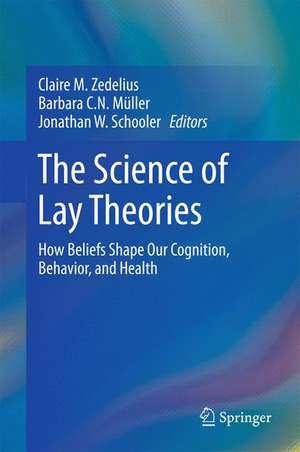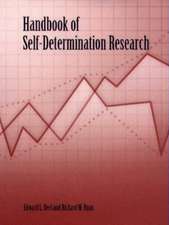The Science of Lay Theories: How Beliefs Shape Our Cognition, Behavior, and Health
Editat de Claire M. Zedelius, Barbara C. N. Müller, Jonathan W. Schooleren Limba Engleză Hardback – 23 iul 2017
Structurally, this volume is organized in three parts. Beginning with a preface by renowned scholar Carol Dweck, the first part looks at the origins and nature of lay theories, and how malleable they are. The second part explores lay theories about common psychological phenomena. The third section discusses lay theories about the metaphysical or supernatural. Finally, the last section explores the important question of how lay theories impact health and health behavior. Taken together, the chapters provide an integrative survey of the science of lay theories, bringing together many perspectives that previously have been studied largely in isolation. This volume is more than the sum of its parts—perspectives from different strands of research provide insights that cut across research disciplines, making novel connections and prompting new directions for this field of study. Shedding light on how our beliefs shape all facets of our lives, The Science of Lay Theories: How Beliefs Shape Our Cognition, Behavior, and Health will appeal to researchers and practitioners in psychology, as well as philosophers, cognitive and developmental neuroscientists, religious scholars, sociologists, and anthropologists.
It is very rare to say of an edited volume of scholarly chapters “I couldn’t put it down!” Yet that was the case with this book. It’s not just that I have worked in this field for many years, but rather, with every chapter I felt I was gaining new insights into what, deep down, people really believe and how these beliefs influence their lives—Carol Dweck, Stanford University, Palo Alto, CA, USA
| Toate formatele și edițiile | Preț | Express |
|---|---|---|
| Paperback (1) | 949.23 lei 6-8 săpt. | |
| Springer International Publishing – 12 mai 2018 | 949.23 lei 6-8 săpt. | |
| Hardback (1) | 955.40 lei 6-8 săpt. | |
| Springer International Publishing – 23 iul 2017 | 955.40 lei 6-8 săpt. |
Preț: 955.40 lei
Preț vechi: 1165.11 lei
-18% Nou
Puncte Express: 1433
Preț estimativ în valută:
182.83€ • 189.80$ • 152.46£
182.83€ • 189.80$ • 152.46£
Carte tipărită la comandă
Livrare economică 22 martie-05 aprilie
Preluare comenzi: 021 569.72.76
Specificații
ISBN-13: 9783319573052
ISBN-10: 3319573055
Pagini: 382
Ilustrații: XII, 382 p. 2 illus.
Dimensiuni: 155 x 235 mm
Greutate: 0.73 kg
Ediția:1st ed. 2017
Editura: Springer International Publishing
Colecția Springer
Locul publicării:Cham, Switzerland
ISBN-10: 3319573055
Pagini: 382
Ilustrații: XII, 382 p. 2 illus.
Dimensiuni: 155 x 235 mm
Greutate: 0.73 kg
Ediția:1st ed. 2017
Editura: Springer International Publishing
Colecția Springer
Locul publicării:Cham, Switzerland
Cuprins
Preface: Lay theories beyond intelligence, a bigger picture perspective by Carol Dweck
Table of Contents
Part I: The origins and nature of lay theories
Chapter 1. The Origins of Lay Theories: The Case of Essentialist Beliefs
by Nick Haslam
Chapter 2. The Motivated Fluidity of Lay Theories of Change
by Anne E. Wilson and Jaslyn A. English
Part II: Explorations in lay theories about human psychological attributes or phenomena
Chapter 3. Lay Theories of Self-Control
by Veronika Job and Gregory M. Walton
Chapter 4. What are People’s Lay Theories about Mind Wandering and How do Those Beliefs Affect Them?
by Claire M. Zedelius and Jonathan W. Schooler
Chapter 5. Lay Theories of Creativity
by Simone Ritter, and Eric Rietzschel
Chapter 6. Mindsets about Malleability and Intergroup Relations
by Aneeta Rattan, and Oriane Georgeac
Chapter 7. Effects of Lay Beliefs on the Justice Motive
by Michèlle Bal, and Kees van den Bos
Part III: Insights into lay theories about the metaphysical or supernatural
Chapter 8. Antecedents, Manifestations, and Consequences of Belief in Mind-Body Dualism by Matthias Forstmann, and Pascal Burgmer
Chapter 9. Lay Theories of the Mind/Brain Relationship and the Allure of Neuroscience
by Diego Fernandez-Duque
Chapter 10. Causes and Consequences of the Belief in Free Will
by Davide Rigoni, Axel Cleeremans, and Marcel Brass
Chapter 11. Religion and its Cultural Evolutionary By-Products by Kristin Laurin
Chapter 12. From the Impossible to the Improbable: A Probabilistic Account of Magical Beliefs and Practices Across Development and Cultures
by Martin Fortier and Sunae Kim
Part IV: Investigation of lay theories about mental and physical health
Chapter 13. Mindsets of Body-Weight
by Jeni L. Burnette, Crystal L. Hoyt, and Kasey Orvidas
Chapter 14. Lay Theories and Metaphors of Health and Illness
by David J. Hauser, Randolph M. Nesse, and Norbert Schwarz
Chapter 15. How Lay Theories Influence our Mental Health
by Adrian Furnham
Table of Contents
Part I: The origins and nature of lay theories
Chapter 1. The Origins of Lay Theories: The Case of Essentialist Beliefs
by Nick Haslam
Chapter 2. The Motivated Fluidity of Lay Theories of Change
by Anne E. Wilson and Jaslyn A. English
Part II: Explorations in lay theories about human psychological attributes or phenomena
Chapter 3. Lay Theories of Self-Control
by Veronika Job and Gregory M. Walton
Chapter 4. What are People’s Lay Theories about Mind Wandering and How do Those Beliefs Affect Them?
by Claire M. Zedelius and Jonathan W. Schooler
Chapter 5. Lay Theories of Creativity
by Simone Ritter, and Eric Rietzschel
Chapter 6. Mindsets about Malleability and Intergroup Relations
by Aneeta Rattan, and Oriane Georgeac
Chapter 7. Effects of Lay Beliefs on the Justice Motive
by Michèlle Bal, and Kees van den Bos
Part III: Insights into lay theories about the metaphysical or supernatural
Chapter 8. Antecedents, Manifestations, and Consequences of Belief in Mind-Body Dualism by Matthias Forstmann, and Pascal Burgmer
Chapter 9. Lay Theories of the Mind/Brain Relationship and the Allure of Neuroscience
by Diego Fernandez-Duque
Chapter 10. Causes and Consequences of the Belief in Free Will
by Davide Rigoni, Axel Cleeremans, and Marcel Brass
Chapter 11. Religion and its Cultural Evolutionary By-Products by Kristin Laurin
Chapter 12. From the Impossible to the Improbable: A Probabilistic Account of Magical Beliefs and Practices Across Development and Cultures
by Martin Fortier and Sunae Kim
Part IV: Investigation of lay theories about mental and physical health
Chapter 13. Mindsets of Body-Weight
by Jeni L. Burnette, Crystal L. Hoyt, and Kasey Orvidas
Chapter 14. Lay Theories and Metaphors of Health and Illness
by David J. Hauser, Randolph M. Nesse, and Norbert Schwarz
Chapter 15. How Lay Theories Influence our Mental Health
by Adrian Furnham
Notă biografică
Dr. Claire Zedelius is working as a postdoctoral researcher in Jonathan Schooler’s META (Memory, Emotion, Thought, Awareness) lab. One of her research lines examines the effects of mind wandering or daydreaming on different aspects of creativity. Another line of her research focuses on the roles of meta-awareness and meta-cognitive beliefs in mind wandering. Claire did her dissertation research at the social psychology department at Utrecht University (the Netherlands), where she worked with Henk Aarts studying conscious and unconscious processes in human reward pursuit.
Dr. Barbara Müller is an Assistant Professor at the Communication Science department of the Behavioural Science Institute at Radboud University in Nijmegen, The Netherlands. In her work, she investigates the developmental and neurocognitive mechanisms of human/robot interactions, and how these interactions can be improved. Her second line of research focuses on social influence in health communication. She is particularly interested in how people can convince themselves to adopt a healthy lifestyle, instead of being convinced by someone else. Barbara did her dissertation research at Radboud University, where she worked with Rick van Baaren and Ap Dijksterhuis on action co-representation of non-biological actions.
Dr. Jonathan Schooler is a Professor in the Department of Psychological and Brain Sciences at the University of California Santa Barbara. He oversees the META lab and is the Director of UCSB’s Center for Mindfulness and Human Potential. Jonathan pursues research on consciousness, memory, the relationship between language and thought, problem-solving, and decision-making. He is particularly interested in exploring phenomena that intersect between the empirical and the philosophical such as how fluctuations in people’s awareness of their experience mediate mind-wandering and how people’s theories about the mind influence how they behave.
Dr. Barbara Müller is an Assistant Professor at the Communication Science department of the Behavioural Science Institute at Radboud University in Nijmegen, The Netherlands. In her work, she investigates the developmental and neurocognitive mechanisms of human/robot interactions, and how these interactions can be improved. Her second line of research focuses on social influence in health communication. She is particularly interested in how people can convince themselves to adopt a healthy lifestyle, instead of being convinced by someone else. Barbara did her dissertation research at Radboud University, where she worked with Rick van Baaren and Ap Dijksterhuis on action co-representation of non-biological actions.
Dr. Jonathan Schooler is a Professor in the Department of Psychological and Brain Sciences at the University of California Santa Barbara. He oversees the META lab and is the Director of UCSB’s Center for Mindfulness and Human Potential. Jonathan pursues research on consciousness, memory, the relationship between language and thought, problem-solving, and decision-making. He is particularly interested in exploring phenomena that intersect between the empirical and the philosophical such as how fluctuations in people’s awareness of their experience mediate mind-wandering and how people’s theories about the mind influence how they behave.
Textul de pe ultima copertă
This timely and important collection broadens our understanding of the ways in which lay theories (also known as folk psychologies, implicit theories, naïve theories, or mindsets) impact our lives and social relations. Moving well beyond lay theories as applied to intelligence and achievement, this volume considers lay theories in an admirably wide context, including perspectives on prejudice, creativity, self-regulation, health, free will, justice, magic, religion and more. Eminent and emerging scholars alike provide a comprehensive overview that presents and synthesizes cutting edge contemporary research on lay theories, spanning social, cognitive, developmental, cultural, and clinical psychology.
Structurally, this volume is organized in three parts. Beginning with a preface by renowned scholar Carol Dweck, the first part looks at the origins and nature of lay theories, and how malleable they are. The second part explores lay theories about common psychological phenomena. The third section discusses lay theories about the metaphysical or supernatural. Finally, the last section explores the important question of how lay theories impact health and health behavior. Taken together, the chapters provide an integrative survey of the science of lay theories, bringing together many perspectives that previously have been studied largely in isolation. This volume is more than the sum of its parts—perspectives from different strands of research provide insights that cut across research disciplines, making novel connections and prompting new directions for this field of study. Shedding light on how our beliefs shape all facets of our lives, The Science of Lay Theories: How Beliefs Shape Our Cognition, Behavior, and Health will appeal to researchers and practitioners in psychology, as well as philosophers, cognitive and developmental neuroscientists, religious scholars, sociologists, and anthropologists.
It is very rare to say of an edited volume of scholarly chapters “I couldn’t put it down!” Yet that was the case with this book. It’s not just that I have worked in this field for many years, but rather, with every chapter I felt I was gaining new insights into what, deep down, people really believe and how these beliefs influence their lives—Carol Dweck, Stanford University, Palo Alto, CA, USA
Structurally, this volume is organized in three parts. Beginning with a preface by renowned scholar Carol Dweck, the first part looks at the origins and nature of lay theories, and how malleable they are. The second part explores lay theories about common psychological phenomena. The third section discusses lay theories about the metaphysical or supernatural. Finally, the last section explores the important question of how lay theories impact health and health behavior. Taken together, the chapters provide an integrative survey of the science of lay theories, bringing together many perspectives that previously have been studied largely in isolation. This volume is more than the sum of its parts—perspectives from different strands of research provide insights that cut across research disciplines, making novel connections and prompting new directions for this field of study. Shedding light on how our beliefs shape all facets of our lives, The Science of Lay Theories: How Beliefs Shape Our Cognition, Behavior, and Health will appeal to researchers and practitioners in psychology, as well as philosophers, cognitive and developmental neuroscientists, religious scholars, sociologists, and anthropologists.
It is very rare to say of an edited volume of scholarly chapters “I couldn’t put it down!” Yet that was the case with this book. It’s not just that I have worked in this field for many years, but rather, with every chapter I felt I was gaining new insights into what, deep down, people really believe and how these beliefs influence their lives—Carol Dweck, Stanford University, Palo Alto, CA, USA
Caracteristici
Covers the impact of lay theories or mindsets on topics such as prejudice, creativity, self-regulation, health, free will, and religion
Includes preface written by prestigious psychological researcher, Dr. Carol Dweck
Provides an integrative perspective on the psychology of lay theories
Includes supplementary material: sn.pub/extras
Includes supplementary material: sn.pub/extras
Includes preface written by prestigious psychological researcher, Dr. Carol Dweck
Provides an integrative perspective on the psychology of lay theories
Includes supplementary material: sn.pub/extras
Includes supplementary material: sn.pub/extras














